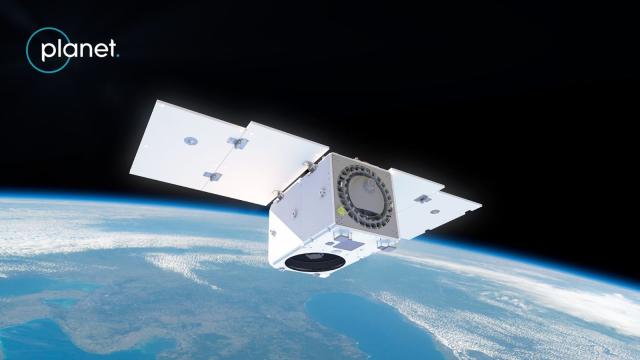San Francisco-based Planet Labs has announced plans to deploy a global constellation consisting of 32 Earth-observing satellites. Called Pelican, the fleet will monitor such things as political conflicts, natural disasters, and the ongoing effects of climate change.
The Pelican constellation is “designed to efficiently capture brief and rapidly changing events as they unfold,” according to a Planet Labs press release. This functionality jibes with the company’s stated goal: to “image all of Earth’s landmass every day, and make global change visible, accessible and actionable.” Construction of the 32-satellite constellation is scheduled to begin next year, according to satellite imagery and data specialist Planet Labs.
Planet Labs, which manages and operates the PlanetScope and SkySat constellations, says the Pelican satellites represent a major step forward in terms of its capabilities. This latest announcement suggests the company is continuing to broaden and refine its orbital offerings.
Working together, the Pelican satellites will allow for more frequent imaging of single sites and at higher spatial resolutions. The system should also result in faster access to data, the company says. In the press release, Will Marshall, Planet Labs co-founder and CEO, said Pelican will “meet the evolving needs of customers who want real-time information about global events as they unfold — from floods and wildfires to political conflicts and threats to human rights.”
Pelican won’t replace the existing SkySat constellation, which consists of 21 satellites, but will instead “replenish and improve” the company’s existing capabilities, the company said. The upcoming constellation should be capable of acquiring images of the same location 12 times per day, and as many as 30 per day at the mid-latitudes. According to a CNBC report, Maxar, a competitor in this space, claims its satellites can re-visit single locations up to 15 times each day. For Planet Labs, this improved re-visit capability should result in more reliable visual access to the surface, such as in the event of cloudy weather. Also, the company’s customers should be able to download data more efficiently owing to improved latency. The images also promise to look very good, as Pelican will boast 11.8 inch (30 cm) resolution imagery.
In terms of sales, the company is targeting the defence sector, intelligence services, civil governments, environmental scientists, disaster planners, and software companies (for developing maps, as an example). Planet Labs says its customers will be able to tap into Pelican data and also observations made by the company’s pre-existing satellite systems.
Floating in low Earth orbit, the constellation will keep tabs on our civilisation and Earth’s natural systems, tracking such things as gradual demographic shifts, conflict zones, storms, wildfires, and altered coastlines. Pelican should provide highly detailed before-and-after images, particularly in the event of natural or human-caused disasters. The near real-time data will better equip disaster planners and other stakeholders when responding to serious events, the company says.
Details, such as the operational altitude of the satellites, safety considerations (such as satellite de-orbiting capabilities and trackability), and potential disruptions to ground-based astronomy, were not disclosed. Planet Labs did not immediately respond to our request for more information.
Planet Labs is a public company that began trading on the New York Stock Exchange in December 2021, in a move made possible by a SPAC deal. The company raised $US250 ($347) million in funding shortly afterwards and claims to have a “war chest” of $US300 ($416) million.
